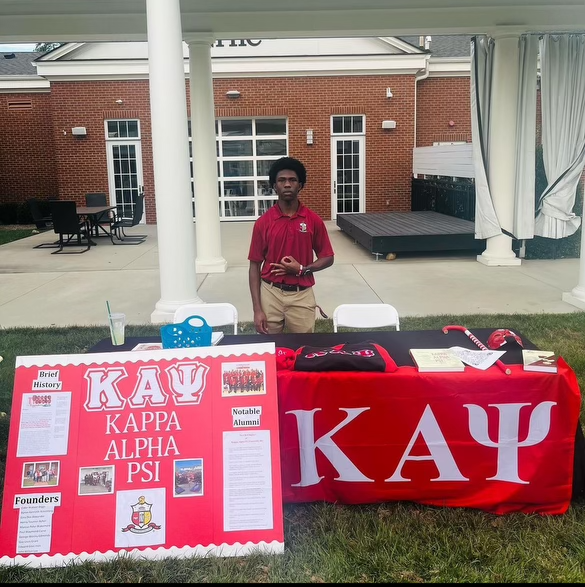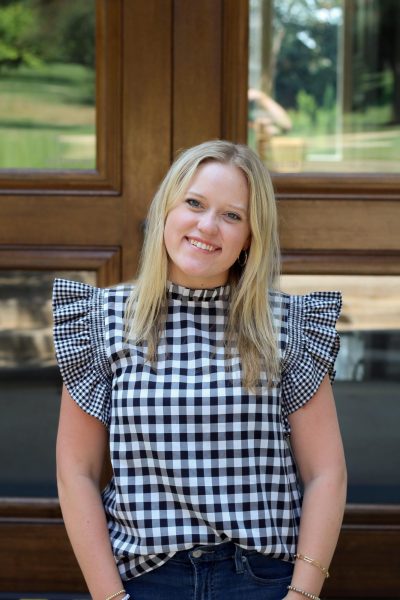Over half of students at Wofford College are active members of Greek life organizations. The college has four chapters from the National Panhellenic Conference and six Interfraternity Council fraternities. The college is also involved in the National Pan-Hellenic Conference (NPHC) organizations, or the Divine 9 historically Black fraternities and sororities.
The Omicron Chi chapter of Alpha Phi Alpha was founded in 1982. Six years later, the Nu Chi chapter of Kappa Alpha Psi was founded in 1988 on Wofford’s campus.
The Nu Chi chapter of Kappa Alpha Psi currently has two active members at Wofford. Hayden Pendergrass ‘26 is the Polemarch, a term used to refer to the chapter’s leader.
Pendergrass is grateful for the leadership opportunities and networking experiences that have been given to him through his experience in his organization. However, Pendergrass recognizes that joining a Divine 9 organization is expensive.
The Nu Chi chapter has hosted fundraising events throughout the semester to financially support the chapter.
The Black Alumni Summit hosted during Homecoming weekend of 2023 really sparked the interest in bringing the Omicron Chi chapter of Alpha Phi Alpha back to life, because Darrel Mathews, former national president of Alpha Phi Alpha spoke to Wofford Alpha alumni.
James Stukes, assistant dean of student success, became a member of Alpha Phi Alpha while attending East Tennessee State University in 2008.
Alpha Phi Alpha, founded at Cornell University in 1906, was the first historically Black Greek letter organization.
Wofford College President Nayef Samhat, Chief Equity Officer and Vice President for Community Initiatives Dwain Pruitt, Director of Fraternity and Sorority Life Karlee Tate and Associate Dean of Students Ashley Owen all helped and were encouraging in the process of restoring the Alpha Phi Alpha Chapter.
Being a member of a Divine 9 organization at a predominantly white institution creates a deeper sense of commodity and community. Bringing these NPHC chapters back to life will provide additional spaces for students to come together under common goals and ideals.
The biggest issue regarding the restoration of NPHC organizations is sustainability and ensuring that the demographics of the college provide a large pool of potential new members in upcoming years
According to Stukes, the major difference between NPC and IFC organizations and the Divine 9 chapters is the recruitment process. For NPHC organizations, recruitment is more discreet. There is no single recruitment system encompassing all chapters.Instead, organizations complete membership selection on an individual basis.
Another difference between NPHC organizations and the NPC and IFC organizations is that they typically prioritize hands-on service in the local community rather than working with national philanthropic organizations.
Some NPHC organizations serve the community by mentoring elementary school students, helping the elderly and hosting voter registration drives.
Stukes wants to see a constant presence of Divine 9 organizations at Wofford. A strong and sustained presence of NPHC organizations on campus would ideally make a more diverse group of students feel a sense of belonging.
Greek organizations provide students with accountability in academics and leadership opportunities, as well as an opportunity to network with others. When students join these organizations, they are able to develop as young adults.
Kappa Alpha Psi hinted toward new members of the organization, posting on their Instagram (@nx_nupes) on Sunday, Mar. 3, stating that new members are coming. The organization is chartered at Wofford and is connected to Limestone University.
The expectation of new members joining Kappa Alpha Psi is promising for the future of NPHC organizations at Wofford. Alpha Phi Alpha is hoping to reinstate the activity of their charter for the Fall 2024 semester, meaning new members could be joining a year from now.
“I would like to see NPHC, IFC, and NPC collaborate in a continuous way. Fostering collaboration helps us see that while we are different in some ways, we are alike in a lot of other ways,” Stukes said. “I would also encourage students to ask questions about these organizations and attend events.”






























